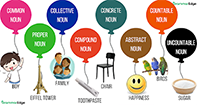×
Change Avatar
Predicate Nouns
console:
What Is a Predicate Noun?
A Predicate Noun, or Predicate Nominative, is a noun or noun phrase that comes after a linking verb. It often gives more information about the subject of the sentence, identifying or describing a state-of-being or just giving more specificity.
How Do I Identify One?
In general, there are three rules of thumb you can follow to find a predicate nominative.
1) It MUST follow a linking verb. Linking verbs are usually forms of the verb “to be” such as am, is, are, was, or were.
2) It gives more information about the subject of the sentence. It can modify, rename, or just give more information about the subject.
3) It names or describes a state-of-being. State-of-being can be an identity, a position, or a gerund.
Here are some examples:
| Sentence | Subject | Linking Verb | Predicate Nominative |
|---|---|---|---|
| Ms. Smith is a history buff. | Ms. Smith | is | a history buff |
| These peacocks are the most popular zoo attraction. | These peacocks | are | the most popular zoo attraction. |
| Sarah used to be my babysitter. | Sarah | used to be | my babysitter |
| My bike was the best birthday present. | My bike | was | the best birthday present |
You can see in the chart that there are very specific rules for predicate nouns. Usually, if you can say something is equal to or IS something else, you’re working with a predicate nominative, a word or phrase that gives a more specific meaning to the noun.










